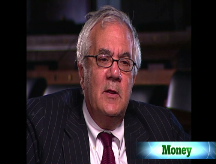Banks not feeling urge to merge
Financial institutions are still unwilling to acquire peers despite attractive prices. More failures may have to happen before the industry consolidates further.
NEW YORK (CNNMoney.com) -- With all the difficulties the nation's banking system has had to endure over the past year, it's a surprise that there hasn't been more of an urge to merge.
Yet, troubled financial institutions have largely resisted combining with rivals. At the same time, well-positioned companies have pursued few acquisitions, even at a time when the stock prices of so many firms have fallen dramatically.
For example, there had been rumors in recent weeks that Wells Fargo (WFC, Fortune 500), which has managed to far outperform its peers, was eyeing struggling savings and loan Washington Mutual (WM, Fortune 500) or the Charlotte, N.C.-based Wachovia (WB, Fortune 500).
But Wells Fargo CEO John Stumpf told the Financial Times this week that his company was not angling for one of its large rivals.
Last week, there were reports that Korea's Development Bank was reportedly considering buying Lehman Brothers (LEH, Fortune 500), whose stock has plunged 79% this year. Since then, there have been doubts that a bid will happen as the overseas firm's regulator warned it to exercise caution in pursuing an acquisition.
And there have been no signs that even the deal maker of the moment - JPMorgan Chase's (JPM, Fortune 500) Jamie Dimon - is interested in extending his company's retail banking network via an acquisition anytime soon after already gobbling up investment bank Bear Stearns earlier this year.
Much of the resistance to buy stems from fears about inheriting another institution's balance sheet problems notes Robert DeYoung, a professor of finance at University of Kansas' School of Business.
But it has also come down to an issue of value. Potential acquirers want to make their purchase at a deep discount - a sentiment not necessarily shared by a target institution.
"I think there is a reticence on both sides," said DeYoung. "There is a price illusion on the part of the board of directors looking to sell a bank and a risk aversion by the buyers."
To be sure, the ranks of the banking industry have thinned somewhat over the past year as troubled institutions were either sold or taken over by the government.
In March, Wall Street's inner circle contracted significantly following the disappearance of Bear Stearns.
And there have been 9 bank failures this year - including the high-profile failure of the California-based mortgage lender IndyMac.
Analysts will get a better sense of how many more banks could be at risk of failing when the FDIC publishes its quarterly reading on the industry on Tuesday.
There were 90 banks on the FDIC's list of problem banks at the end of the first quarter.
But with some analysts betting that the number of failed institutions will approach 300 in the coming years, some well-positioned banks may be waiting for more banks to reach that point scooping them up, said Chip MacDonald, partner in the capital markets group at the law firm Jones Day.
Buying a bank outright means possibly buying some risky assets like a mortgage or construction loan portfolio. But acquiring a bank's holdings after it has failed can be a whole lot cheaper and could come without any of the headaches. That's because the FDIC will typically strip out the worst part of a bank's business and sell the untainted assets and deposits.
"That seems to be a low-cost, low-risk option" said MacDonald. "You get a clean operation with no risk and a lot of liquidity."
Still, forecasting just how the banking industry will change may prove to be just as difficult as calling the bottom in the housing market.
Khanh Vuong, a vice president at financial services rating agency A.M. Best who oversees the bank rating group, expects more mid-sized and smaller companies to eventually get acquired.
But experts note that the biggest unknown is just how quickly and how drastically the industry will shrink from its pre-credit crunch levels.
"It's a little bit of a waiting game," said MacDonald. ![]()




